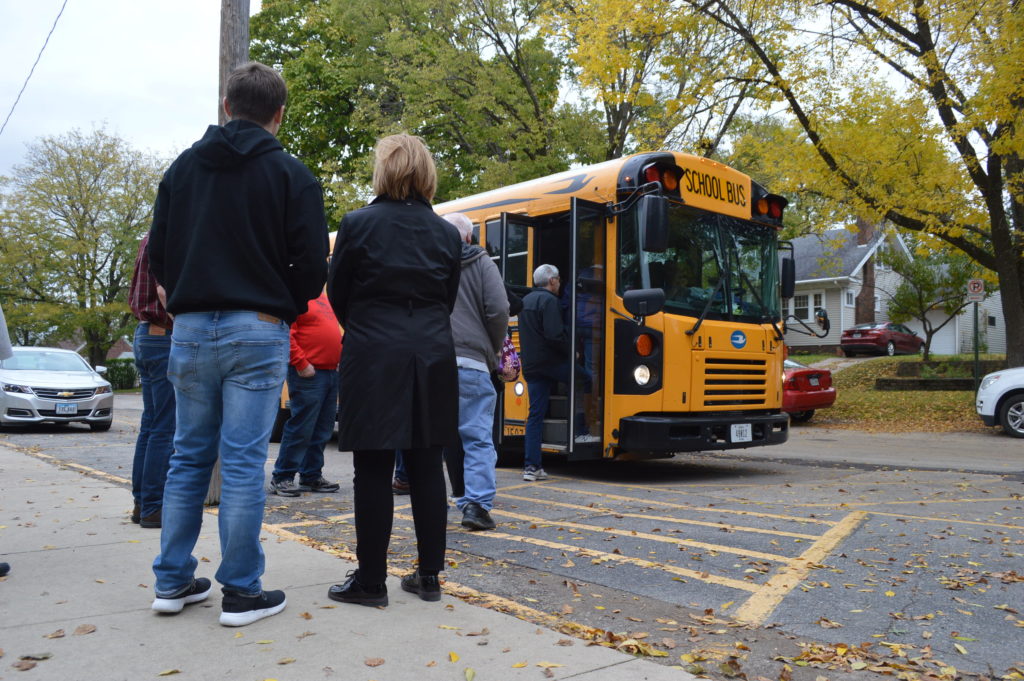
Schools are recommended to be closed for the next four weeks in response to the coronavirus. (photo/Cindy Hadish)
Iowa Gov. Kim Reynolds tonight recommended that Iowa schools close for four weeks, after new cases of community spread of the coronavirus were reported in the state.
Reynolds plans a press conference for Monday, March 16, 2020.
In addition, the U.S. Centers for Disease Control & Prevention (CDC) just released new guidelines that call for postponing gatherings of more than 50 people for the next eight weeks.
Related: Iowa confirms community spread of COVID-19
One of the new patients in Iowa with “community spread” of coronavirus, also known as COVID-19, is being treated at University of Iowa Hospitals & Clinics in Iowa City.
The hospital noted that the patient is currently in isolation, with other patients kept at a safe distance, and those caring for the patient are properly protected.
Community spread occurs when individuals have been infected with the virus and cannot specifically identify the source of the infection, or do not know how or where they became infected.
The patient went to the hospital for emergency care with symptoms associated with COVID-19 and was then admitted. The patient was masked upon arrival, per procedure, and staff members took appropriate precautions.
UIHC offered this advice for practicing good hygiene:
— Use a tissue or your sleeve when you cough or sneeze.
— Do not use your hands when coughing or sneezing to cover your mouth and nose.
— Wash your hands often.
— Use soap and water for at least 20 seconds. You can also use alcohol-based hand sanitizer that contains at least 60% alcohol.
— Maintain a safe distance.
— Take extra measures to put distance between yourself and other people to further reduce your risk of getting ill.
Gov. Reynolds just yesterday announced the first community spread of coronavirus in Iowa.
Read more from the Governor’s Office:
DES MOINES – Upon discovery of the existence of substantial community spread of COVID-19 in the state, Gov. Reynolds is recommending that Iowa schools close for four weeks.
“Based on new information today from the Iowa Department of Public Health, now is the time to move to the next level of response,” Gov. Reynolds stated. “I am now recommending that all Iowa schools close for a period of four weeks to help mitigate the spread of COVID-19.”
Gov. Reynolds is making this recommendation in consultation with the Iowa Department of Public Health (IDPH) and based on CDC guidelines.
Earlier today, IDPH was notified of four additional positive cases of Iowans with COVID-19, for a total of 22 positive cases. According to IDPH, two cases are related to international travel. The individuals are residents of Allamakee County, one is a middle-age adult between 41-60 years; the other is a child, age 0-18 years. The third case is a middle-age Johnson County resident with no identified travel-related risk or exposure to a known COVID-19 case, and is considered the second case of community spread in Iowa. The fourth individual resides in Polk County and is a middle-age adult and indicates a third case of community spread.
One of today’s new cases was the first Iowa test conducted by a national lab. With testing options now expanding, Iowa expects the numbers of positive cases to increase. The governor will hold a press conference tomorrow. The press conference will be open to credentialed members of the press and streamed on her Facebook page.
The state of Iowa is developing policies to ensure continued access to child care during this time of emergency, including meals for low income students.
Also today, Gov. Reynolds signed a Proclamation of Disaster Emergency continuing the proclamation signed on March 9, allowing retailers that sell liquor, beer, wine, carbonated beverages, and other beverages with an Iowa beverage container deposit to stop accepting empty cans and bottles for the duration of this disaster emergency.
On Sunday evening, the CDC updated its mass gathering guidance to postpone for the next 8 weeks any events with 50 or more people. The goal is to reduce introduction of the virus into new communities and to slow the spread of infection in communities already affected by the virus. This recommendation is not intended to supersede the advice of local public health officials.
COVID-19 was first linked to an outbreak in Wuhan, China, but cases have subsequently been identified in several countries, including the U.S. Symptoms of COVID-19 include fever, cough and shortness of breath. Those most at risk of the virus are older adults, and individuals with underlying health conditions.

No Comments Yet